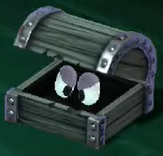Pleaseno: Difference between revisions
No edit summary |
No edit summary Tag: Mobile edit |
||
| (3 intermediate revisions by 3 users not shown) | |||
| Line 1: | Line 1: | ||
{{species infobox | {{species infobox | ||
|image=[[File:SMRPG NS Pleaseno.png| | |image=[[File:SMRPG NS Pleaseno.png|171px]]<br>Artwork from ''Super Mario RPG'' (Nintendo Switch) | ||
|first_appearance=''[[Super Mario RPG: Legend of the Seven Stars]]'' ([[List of games by date#1996|1996]]) | |first_appearance=''[[Super Mario RPG: Legend of the Seven Stars]]'' ([[List of games by date#1996|1996]]) | ||
|latest_appearance=''[[Super Mario RPG (Nintendo Switch)|Super Mario RPG]]'' ([[Nintendo Switch]]) ([[List of games by date#2023|2023]]) | |latest_appearance=''[[Super Mario RPG (Nintendo Switch)|Super Mario RPG]]'' ([[Nintendo Switch]]) ([[List of games by date#2023|2023]]) | ||
| Line 28: | Line 28: | ||
|Jap=ナンダベェ | |Jap=ナンダベェ | ||
|JapR=Nandabē | |JapR=Nandabē | ||
|JapM=Pun on「なんだベ」(''nan dabe'', a Kantō dialect expression meaning "I wonder what it is") and「ナンダロウ」(''Nandarō'', [[Huhwhat#Names in other languages|Huhwhat]]);「兵衛」(''-bē'') is also a Japanese male given name | |JapM=Pun on「なんだベ」(''nan dabe'', a Kantō dialect expression meaning "I wonder what it is") and「ナンダロウ」(''Nandarō'', "[[Huhwhat#Names in other languages|Huhwhat]]");「兵衛」(''-bē'') is also a Japanese male given name | ||
|ChiS=谜达比 | |ChiS=谜达比 | ||
|ChiSR=Mídábǐ | |ChiSR=Mídábǐ | ||
|ChiSM=From「谜」(''mí'', enigma) and the part of Japanese name | |ChiSM=From「谜」(''mí'', "enigma") and the part of Japanese name | ||
|ChiT=謎達比 | |ChiT=謎達比 | ||
|ChiTR=Mídábǐ | |ChiTR=Mídábǐ | ||
|ChiTM=From「謎」(''mí'', enigma) and the part of Japanese name | |ChiTM=From「謎」(''mí'', "enigma") and the part of Japanese name | ||
|Dut=Neetog | |Dut=Neetog | ||
|DutM=Corruption of the | |DutM=Corruption of ''nee, toch'' (the exclamation "no, really") | ||
|Fre=Cocoffre | |||
|FreM=Partial repetition of ''coffre'' ("chest") | |||
|Ger=Lugtruhe | |Ger=Lugtruhe | ||
|GerM=Lie Chest | |GerM=Lie Chest | ||
| | |Ita=Scrignolo argh | ||
| | |ItaM=Li'l chest argh; from ''scrigno'' ([treasure] "chest") and the diminutive suffix ''-olo'' | ||
|Kor=머꼬 | |Kor=머꼬 | ||
|KorR=Meokko | |KorR=Meokko | ||
|KorM=Pun on "뭐꼬" (''mwokko'', a Gyeongsang dialect expression meaning "what?") and "머지" (''Meoji'', Huhwhat) | |KorM=Pun on "뭐꼬" (''mwokko'', a Gyeongsang dialect expression meaning "what?") and "머지" (''Meoji'', "Huhwhat") | ||
|Spa=Trampifia | |Spa=Trampifia | ||
|SpaM=Portmanteau of | |SpaM=Portmanteau of ''trampa'' ("trap") and ''pifia'' (colloquialism for "fault") | ||
}} | }} | ||
Revision as of 07:00, August 23, 2024
| Pleaseno | |
|---|---|
 Artwork from Super Mario RPG (Nintendo Switch) | |
| First appearance | Super Mario RPG: Legend of the Seven Stars (1996) |
| Latest appearance | Super Mario RPG (Nintendo Switch) (2023) |
| Variant of | Whuhoh |
A Pleaseno (originally known as a Box Boy) is a rare, haunted chest that can be found in Bean Valley in Super Mario RPG: Legend of the Seven Stars and its remake. A Pleaseno resembles a pudgy ghost hiding in a treasure box. When the chest is closed, the Pleaseno looks like a regular treasure box; this mimicry allows it to easily prey on adventurers searching for valuable items, such as Mario and his party. It can also be encountered if the player has fought it already and every symbol in a "roulette" treasure box is different. In battle, a Pleaseno is a tough opponent: It has high attack, high defense, and high HP. It is also unaffected by status ailment-inducing attacks. The best way to defeat the Pleaseno is to make good use of its weakness to jump.
A Pleaseno uses a few special attacks, including Scream, which is a technique that cuts a party member's attack and defense in half, and Carni-Kiss, a powerful bite that causes significant damage. Moreover, the Pleaseno often summons Jinnie, another powerful enemy.
Coincidentally, the ghost within the Pleaseno bears a heavy resemblance to a Peepa.
Profiles and statistics
Super Mario RPG: Legend of the Seven Stars
| Super Mario RPG: Legend of the Seven Stars enemy | |||||||||
|---|---|---|---|---|---|---|---|---|---|
| Box Boy | |||||||||
| HP | 900 | FP | 100 | Speed | 1 | ||||
| Location(s) | Bean Valley | Attack | 180 | Magic attack | 80 | ||||
| Role | Common | Defense | 110 | Magic defense | 40 | ||||
| Bonus Flower | Attack Up! (20%) | Yoshi Cookie | None | Morph rate | 0% | ||||
| Evade | 0% | Magic evade | 0% | Spells | Water Blast (CS), Blast (CS) | ||||
| Weak | Jump | Strong | Fire, Thunder, Ice, Fear, Poison, Sleep, Mute, Critical | Sp. attacks | Carni-Kiss, Scream | ||||
| Coins | 150 | Exp. points | 100 | Items | None | ||||
| Psychopath | "Been waitin' 100 years!" | ||||||||
Super Mario RPG (Nintendo Switch)
| Super Mario RPG enemy | |||||||||
|---|---|---|---|---|---|---|---|---|---|
| Pleaseno | |||||||||

|
HP | 900 | Weak Elements | Drops | N/A | ||||
| Exp. | 100 | Weak Statuses | N/A | Rare Drops | N/A | ||||
| Found in | Bean Valley | ||||||||
| Monster List profile | Freakin' out about what might be in the box? You should be—it's a Pleaseno! They never, ever stop watching you. | ||||||||
| Thought Peek | "*rattle* *rattle* I waited 100 years for that. And it was worth it." | ||||||||
| Animations | |||||||||
Gallery
Names in other languages
| Language | Name | Meaning | Notes |
|---|---|---|---|
| Japanese | ナンダベェ[?] Nandabē |
Pun on「なんだベ」(nan dabe, a Kantō dialect expression meaning "I wonder what it is") and「ナンダロウ」(Nandarō, "Huhwhat");「兵衛」(-bē) is also a Japanese male given name | |
| Chinese (simplified) | 谜达比[?] Mídábǐ |
From「谜」(mí, "enigma") and the part of Japanese name | |
| Chinese (traditional) | 謎達比[?] Mídábǐ |
From「謎」(mí, "enigma") and the part of Japanese name | |
| Dutch | Neetog[?] | Corruption of nee, toch (the exclamation "no, really") | |
| French | Cocoffre[?] | Partial repetition of coffre ("chest") | |
| German | Lugtruhe[?] | Lie Chest | |
| Italian | Scrignolo argh[?] | Li'l chest argh; from scrigno ([treasure] "chest") and the diminutive suffix -olo | |
| Korean | 머꼬[?] Meokko |
Pun on "뭐꼬" (mwokko, a Gyeongsang dialect expression meaning "what?") and "머지" (Meoji, "Huhwhat") | |
| Spanish | Trampifia[?] | Portmanteau of trampa ("trap") and pifia (colloquialism for "fault") |

